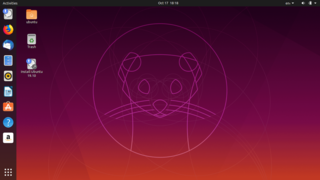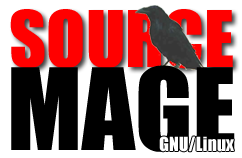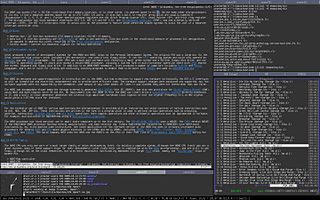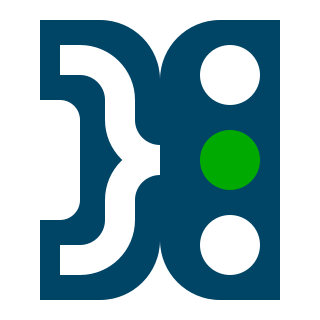
Debian, also known as Debian GNU/Linux, is a Linux distribution composed of free and open-source software, developed by the community-supported Debian Project, which was established by Ian Murdock on August 16, 1993. The first version, Debian 0.01, was released on September 15, 1993, and the first stable version, 1.1, was released on June 17, 1996. The Debian Stable branch is the most popular edition for personal computers and servers, and is the basis for many other distributions.
The djbdns software package is a DNS implementation. It was created by Daniel J. Bernstein in response to his frustrations with repeated security holes in the widely used BIND DNS software. As a challenge, Bernstein offered a $1000 prize for the first person to find a security hole in djbdns, which was awarded in March 2009 to Matthew Dempsky.

GNU is an operating system and an extensive collection of computer software. GNU is composed wholly of free software, most of which is licensed under the GNU Project's own General Public License (GPL).

A Linux distribution is an operating system made from a software collection, which is based upon the Linux kernel and, often, a package management system. Linux users usually obtain their operating system by downloading one of the Linux distributions, which are available for a wide variety of systems ranging from embedded devices and personal computers to powerful supercomputers.
Sorcerer was a source-based Linux distribution. The distribution downloads and compiles source code to install and update installed software.

Source Mage is a Linux distribution. As a package is being installed, its source code is automatically downloaded, compiled, and installed. Source Mage is descended from Sorcerer.

Advanced Package Tool, or APT, is a free-software user interface that works with core libraries to handle the installation and removal of software on Debian, Ubuntu, and related Linux distributions. APT simplifies the process of managing software on Unix-like computer systems by automating the retrieval, configuration and installation of software packages, either from precompiled files or by compiling source code.
dpkg is the software at the base of the package management system in the free operating system Debian and its numerous derivatives. dpkg is used to install, remove, and provide information about .deb packages.

The GNU C Library, commonly known as glibc, is the GNU Project's implementation of the C standard library. Despite its name, it now also directly supports C++. It was started in the early 1990s by the Free Software Foundation (FSF) for their GNU operating system.

In Unix computing, Ion is a tiling and tabbing window manager for the X Window System. It is designed such that it is possible to manage windows using only a keyboard, without needing a mouse. It is the successor of PWM and is written by the same author, Tuomo Valkonen. Since the first release of Ion in the summer 2000, similar alternative window management ideas have begun to show in other new window managers: Larswm, ratpoison, StumpWM, wmii, xmonad and dwm.
The Debian Free Software Guidelines (DFSG) is a set of guidelines that the Debian Project uses to determine whether a software license is a free software license, which in turn is used to determine whether a piece of software can be included in Debian. The DFSG is part of the Debian Social Contract.

Xpdf is a free and open-source PDF viewer for operating systems supported by the Qt toolkit. Versions prior to 4.00 were written for the X Window System and Motif.
cdrtools is a collection of independent projects of free software/open source computer programs, created by Jörg Schilling and others.
In 2006, a branding issue developed when Mike Connor, representing the Mozilla Corporation, requested that the Debian Project comply with Mozilla standards for use of the Thunderbird trademark when redistributing the Thunderbird software. At issue were modifications not approved by the Mozilla Foundation, when the name for the software remained the same.

gNewSense is a Linux distribution based on Debian, and developed with sponsorship from the Free Software Foundation. Its goal is user-friendliness, but with all proprietary and non-free software removed. The Free Software Foundation considers gNewSense to be composed entirely of free software.
GNU variants are operating systems based upon the GNU operating system. According to the GNU project and others, these also include most operating systems using the Linux kernel and a few others using BSD-based kernels.
java-gnome is a set of language bindings for the Java programming language for use in the GNOME desktop environment. It is part of the official GNOME language bindings suite and provides a set of libraries allowing developers to write computer programs for GNOME using the Java programming language and the GTK+ cross-platform widget toolkit.
The Debian build toolchain is a collection of software utilities used to create Debian source packages (.dsc) and Debian binary packages from upstream source tarballs.

Linux-libre is an operating system kernel and a GNU package.









